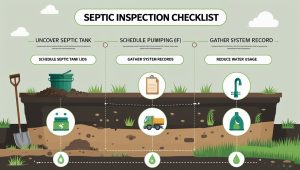In Pennsylvania, septic systems play a vital role in managing wastewater, particularly in rural areas where centralized sewer systems are unavailable. However, many homeowners may unknowingly operate illegal septic systems, which can lead to significant penalties. Understanding the fines for illegal septic systems in PA is essential for homeowners to avoid costly mistakes and ensure compliance with state regulations. This article will delve into the specific fines associated with illegal systems, the importance of adhering to local laws, and practical steps homeowners can take to maintain compliance.
Table of Contents
- Understanding Septic Systems
- Regulations Surrounding Septic Systems in Pennsylvania
- Consequences of Illegal Septic Systems
- How to Avoid Fines
- Case Studies
- Additional Resources
- Frequently Asked Questions (FAQs)
- Septifix
- Septic Permit Links by State
Understanding Septic Systems
What is a Septic System?
A septic system is an underground wastewater treatment solution. It typically consists of a tank and a drain field. The tank holds waste, while the drain field disperses treated water into the soil. Proper functioning is vital to prevent environmental contamination.
Importance of Compliance
Complying with Pennsylvania’s septic system regulations is not just about avoiding fines; it is crucial for protecting public health and the environment. Illegal septic systems can lead to groundwater contamination and pose serious health risks to communities. By understanding the fines for illegal septic systems in PA, homeowners can better appreciate the importance of maintaining their systems according to state standards. Regular inspections, proper maintenance, and timely upgrades can prevent violations and ensure that septic systems function effectively, safeguarding both the homeowner’s investment and the surrounding ecosystem.
Regulations Surrounding Septic Systems in Pennsylvania
Pennsylvania has strict regulations governing septic systems. Homeowners must follow these guidelines:
- Permits: Obtain necessary permits before installation.
- Licensed Professionals: Hire licensed professionals for installation and maintenance.
- Regular Inspections: Schedule inspections every three years to ensure proper functioning.
For detailed regulations regarding septic tanks, refer to 25 Pa. Code § 73.31, which outlines standards for septic tank capacity, design, and maintenance requirements.
Consequences of Illegal Septic Systems
Operating an illegal septic system can result in significant consequences:
Types of Fines
Homeowners may face fines ranging from $300 to $10,000, depending on the violation’s severity. For example:
- Failure to Obtain Permits: This can lead to fines of $1,000 or more.
- Improper Installation: Homeowners may incur fines up to $5,000 if their system does not meet state standards.
Legal Action
Persistent violations can lead to legal action. The state may issue court orders requiring homeowners to cease operations or remediate issues.
How to Avoid Fines
Avoiding fines associated with illegal septic systems is possible by following these steps:
- Stay Informed: Regularly check local regulations regarding septic systems.
- Schedule Inspections: Have your system inspected at least every three years by a licensed professional.
- Maintain Records: Keep detailed records of all inspections and maintenance performed on your system.
- Educate Yourself: Understand what constitutes a compliant system versus an illegal one.
By following these steps, homeowners can ensure their septic systems remain compliant with state laws and avoid unnecessary penalties.
Case Studies
Several case studies illustrate the consequences faced by homeowners with illegal septic systems:
- A homeowner in Lancaster County was fined $5,000 for operating an unpermitted system that caused groundwater contamination.
- In another case, a family faced legal action after failing multiple inspections due to improper installation practices.
These examples highlight the importance of adhering to state regulations and maintaining proper documentation regarding one’s septic system.
Conclusion
Understanding the fines for illegal septic systems in PA is crucial for homeowners who wish to avoid costly penalties. By staying informed about local regulations and ensuring compliance through regular inspections and maintenance, homeowners can protect their investments and contribute positively to environmental health. Need help with your septic system? Check out our product reviews for reliable services!
Additional Resources
- For more information on sewage facilities and regulations in Pennsylvania, visit the Pennsylvania Department of Environmental Protection.
- Check local requirements for your area at Delaware County Health Department.
- Learn about approved sewage haulers in your area through Washington Township’s Septic Information.
- For general guidelines on maintaining your septic system, refer to Bucks County Sewage Program.
Frequently Asked Questions (FAQs)
What are the specific requirements for installing a septic system in Pennsylvania?
In Pennsylvania, you must obtain a permit from your local sewage enforcement officer (SEO) before installing a septic system. The installation must comply with Act 537 regulations and be performed by a licensed contractor.
How often should I have my septic tank pumped in Pennsylvania?
The Pennsylvania Department of Environmental Protection recommends having your septic tank pumped every three to five years, depending on household size and water usage.
What are the penalties for failing to comply with Pennsylvania’s septic system regulations?
Penalties can range from fines of $300 to $10,000 depending on the severity of the violation, such as failing to obtain permits or improper installation.
Who should I contact if I suspect my septic system is failing?
If you suspect your septic system is failing, contact your local sewage enforcement officer (SEO) or a licensed septic contractor immediately for an inspection and necessary repairs.
Are there any financial assistance programs available for upgrading my septic system in Pennsylvania?
Yes, some counties in Pennsylvania offer financial assistance programs for homeowners needing to upgrade or replace their septic systems due to non-compliance or failure. Check with your local health department or SEO for available programs.
Septifix









